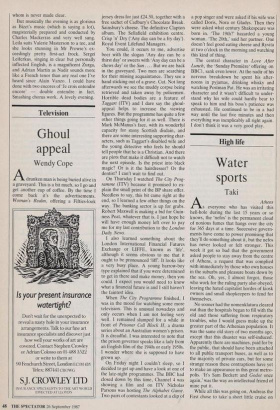Television
Ghoul appeal
Wendy Cope
Adrunken man is being buried alive in a graveyard. This is a bit much, so I go and get another cup of coffee. By the time I come back it's the advertisements. Woman's Realm, offering a Fifties-look jersey dress for just £24.50, together with a free sachet of Cadbury's Chocolate Break.
Sainsbury's cheese. The definitive Clapton album. The Sellafield exhibition centre. Crisp 'n' Dry (`Any day can be a fry day'). Royal Event Lifefund Managers.
You could, it occurs to me, advertise beer with the slogan 'Any day can be a thirst day' or sweets with 'Any day can be a chews day' or the Sun.... But we are back in the graveyard. Two men are searching for their missing acquaintance. They see a hand sticking out of a grave. Cut. Not long afterwards we see the muddy corpse being retrieved and taken away by policemen. Horrible dead bodies are a feature of Taggart (ITV) and I dare say the ghoul- appeal helps to increase the viewing figures. But the programme has quite a few other things going for it as well. There is Mark McManus's face, with its wonderful capacity for stony Scottish disdain, and there are some interesting supporting char- acters, such as Taggart's disabled wife and the young detective who feels he should tell people that he is a Christian. And there are plots that make it difficult not to watch the next episode. Is the priest into black magic? Or is it the hairdresser? Or the dentist? I can't wait to find out.
On Thursday I watched The City Prog- ramme (ITV) because it promised to ex- plain the small print of the BP share offer. Needless to say, this bit came right at the end, so I learned a few other things on the way. The banking sector is up for grabs. Robert Maxwell is making a bid for Guin- ness Peat, whatever that is. I just hope he will have enough money left over to pay me for my last contribution to the London Daily News.
I also learned something about the London International Financial Futures Exchange or LIFFE, known as 'life', although it seems obvious to me that it ought to be pronounced 'liff . It looks like a very busy place. A young barrow-boy type explained that if you were determined to get in there and make money, then you could. I expect you would need to know what a financial future is and I still haven't the faintest idea.
When The City Programme finished, I was in the mood for watching some more television. This is unusual nowadays and only occurs when I am not feeling very well. I remained slumped for a while in front of Prisoner Cell Block H, a drama series about an Australian women's prison. It is dreadful. I was interested to note that the prison governor speaks like a lady from an English film of the 1940s or early 1950s. I wonder where she is supposed to have grown up.
On Friday night I couldn't sleep, so I decided to get up and have a look at one of the late-night programmes. The BBC had closed down by this time, Channel 4 was showing a film and on ITV Nicholas Parsons was hosting The Alphabet Game. Two pairs of contestants looked at a clip of a pop singer and were asked if his wife was called Doris, Nora or Gladys. Then they were asked what century Shakespeare was born in. 'The 19th?' hazarded a young woman. 'The 20th,' said her partner. One doesn't feel good eating cheese and Ryvita at two o'clock in the morning and watching this kind of thing.
The central character in Love After Lunch, the 'Sunday Premiere' offering on BBC1, sank even lower. At the nadir of his nervous breakdown he spent his after- noons in pyjamas, drinking whisky and watching Postman Pat. He was an irritating character and it wasn't difficult to under- stand why his wife could hardly bear to speak to him and his boss's patience was exhausted. He continued to be in a bad way until the last five minutes and then everything was inexplicably all right again. I don't think it was a very good play.






























































 Previous page
Previous page